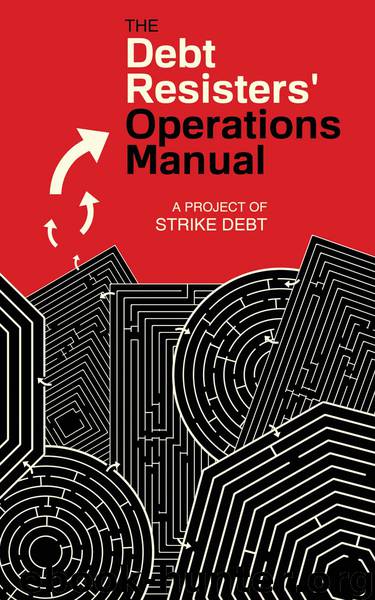The Debt Resisters' Operations Manual by Strike Debt

Author:Strike Debt
Language: eng
Format: epub
Publisher: PM Press
Published: 2014-08-13T16:00:00+00:00
Remittances
In addition to exorbitant check-cashing fees, there are fees for money transfers. Nearly two-thirds of immigrants in New York City, according to a recent survey, reported using remittance services to send money back to their families in their country of origin, 60% of whom send money every month. Most remittances go simply to pay for basic household needs, such as rent, utilities, and buying food. Immigrants hoping to send money outside of the United States may lose as much as 20% of the amount in the process.21 While the Consumer Financial Protection Bureau recently introduced new disclosure rules aimed at stopping sudden and unexpected penalties, there’s really nothing that limits the overall fee.22 By contrast, banks and credit unions charge substantially less for this and other services. Some banks even offer special low-cost money transfers to certain countries. Services that could cost up to $500 annually at a CCO could cost between $30 and $60 annually at a traditional financial institution.23 Many credit unions, and increasingly many banks, have flexible ID requirements, making it simpler for immigrants to open accounts. Be sure to find out if they require a minimum balance to maintain an account and if they require the recipient to have a bank account.
If you must use a money transfer service, be sure to ask what the exchange rate is and how much will actually be given to the recipient. Find out if the recipient will be charged any fees when picking up the money. Remember, you have the right to transfer money in U.S. dollars unless the receiving country has a law requiring money to be converted into the local currency. Be sure to use a licensed transmitter and to keep your receipts. The websites remesamex.gob.mx and remittanceprices.worldbank.org allow you to compare different options and costs when sending money to another country.
Among the unbanked are many undocumented immigrants who believe that without a Social Security card they are unable to open up an account. The law does not require banks to ask you to provide a Social Security number to open an account, nor does it require them to inquire about your immigration status. The law simply requires that banks ask for your name, date of birth, street address, and one of several different kinds of identification numbers. While most banks have stricter policies, an increasing number of banks and credit unions who see opportunity in the growing immigrant population are more flexible.24 Some banks will accept an Individual Tax Identity Number (ITIN) in the place of an SSN. Also, many consulates will provide their citizens with foreign ID cards that banks and credit unions are increasingly accepting. The most popular of these is the Mexican matricula consular. The Mexican consulate provides a list of banks and credit unions that accept this either as primary or secondary ID.
Download
This site does not store any files on its server. We only index and link to content provided by other sites. Please contact the content providers to delete copyright contents if any and email us, we'll remove relevant links or contents immediately.
The Secret History by Donna Tartt(16758)
The Social Justice Warrior Handbook by Lisa De Pasquale(11514)
Thirteen Reasons Why by Jay Asher(7854)
This Is How You Lose Her by Junot Diaz(5841)
Weapons of Math Destruction by Cathy O'Neil(5094)
Zero to One by Peter Thiel(4881)
The Myth of the Strong Leader by Archie Brown(4816)
Promise Me, Dad by Joe Biden(4490)
Beartown by Fredrik Backman(4483)
How Democracies Die by Steven Levitsky & Daniel Ziblatt(4464)
Stone's Rules by Roger Stone(4451)
The Fire Next Time by James Baldwin(4392)
100 Deadly Skills by Clint Emerson(4124)
A Higher Loyalty: Truth, Lies, and Leadership by James Comey(4071)
Rise and Kill First by Ronen Bergman(4059)
The David Icke Guide to the Global Conspiracy (and how to end it) by David Icke(3930)
The Farm by Tom Rob Smith(3904)
Secrecy World by Jake Bernstein(3822)
The Doomsday Machine by Daniel Ellsberg(3768)
